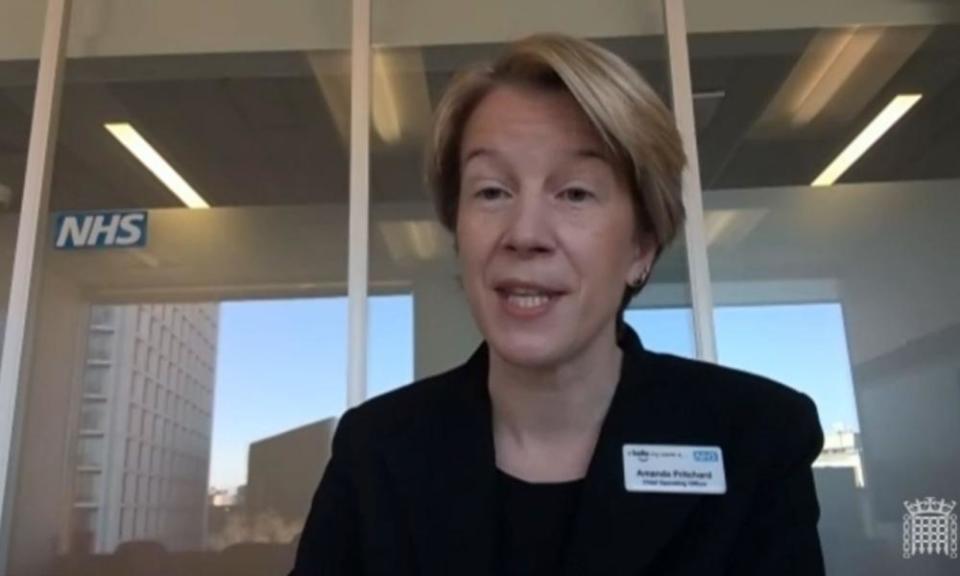NHS deputy confirmed as new head to replace Simon Stevens

Simon Stevens’ deputy has been confirmed as the head of the NHS after months of speculation that the job could go to the head of test and trace, Dido Harding.
Amanda Pritchard will be officially appointed as the NHS chief executive on Sunday in a sign the government is seeking continuity as the health service attempts to recover from the coronavirus pandemic. She is the first female NHS head since its creation in 1948.
The protracted recruitment process has been overshadowed by rows over the candidacy of Harding, whose £37bn test-and-trace scheme has been criticised for being wasteful and having a marginal effect on transmission.
Stevens stands down at the end of this week after seven years in the job and his successor, an NHS veteran, will be given the job of overseeing a huge backlog of routine care after the pandemic has left staff exhausted.
Pritchard has been the chief operating officer of NHS England for the past two years after seven years as the head of Guy’s and St Thomas’, one of England’s biggest hospital groups. Under Tony Blair, she worked in the prime minister’s delivery unit.
She is widely respected by senior NHS leaders who are likely to be relieved that some of the corporate candidates, who also included Doug Gurr, the former head of Amazon UK, did not get the role.
In a statement, Pritchard said she was honoured to become the first woman at the head of the NHS, particularly since three-quarters of the staff are female.
“I have always been incredibly proud to work in the health service but never more so than over the last 18 months as nurses, doctors, therapists, paramedics, pharmacists, porters, cleaners and other staff have responded so magnificently to the Covid pandemic,” she said.
NHS England’s independence from government means Pritchard has been chosen jointly by its board and the Department of Health and Social Care, with significant input from No 10.
Boris Johnson, the health and social care secretary, Sajid Javid, the cabinet secretary, Simon Case, and the chair of NHS England’s board, David Prior – a former Conservative MP and health minister – have all been closely involved in the appointment process. Pritchard will be the head of an organisation with a £150bn annual budget that employs 1.2 million staff.
Johnson tweeted his congratulations on Wednesday. “Delighted Amanda Pritchard has been appointed as the new NHS Chief Executive, the first woman in the NHS’s history to hold the post,” he wrote.
Health sector unions welcomed her appointment, but said she must address staff shortages and a real-terms pay cut faced by their members.
Pat Cullen, the general secretary of the Royal College of Nursing, said: “We expect Ms Pritchard to listen to nursing voices on the ground. Nursing staff across health and care have experienced a year like no other and need support like never before. With tens of thousands of vacancies, the new Chief Executive must urgently address staffing levels.”
Sources say Javid has taken a leading role in identifying Stevens’ successor, despite only succeeding Matt Hancock on 26 June. He is understood to have been behind axing Harding from the longlist several weeks ago.
Related: West Suffolk hospital chief resigns prior to bullying claims review
Harding raised eyebrows in the NHS by briefing a Sunday newspaper about her application, including a plan to make the service’s workforce entirely homegrown, which bosses of health trusts privately dismissed as “nonsense” and “impossible”. Hancock was keen to see her land the job.
Harding had made a pitch for managing rising waiting lists by arguing that the NHS could not go back to pre-pandemic normality and had to build on innovations such as online appointments. Mark Britnell, a KPMG executive and former NHS chief executive, is understood to have been runner-up.
Pritchard has worked in the NHS for more than 20 years after attending a comprehensive school in Durham and studying history at Oxford University.
Stevens has repeatedly put back his departure to deal with the pandemic but has been adamant about leaving at the end of this month. He became a cross-bench peer three weeks ago and is expected to become a prominent advocate for social care reform and related issues.
He recently advised his successor that they “should continue to make the weather on some of the big debates the health service needs to be a part of”, arguing “we need to have a view on inequalities, social care etcetera”.

 Yahoo News
Yahoo News 